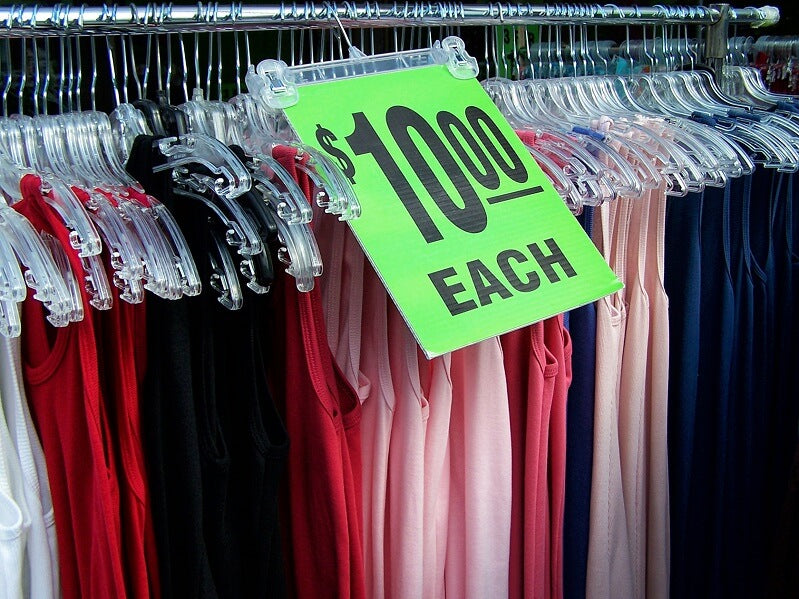Are you getting ‘value’ for money when shopping? Every day we are surrounded by signs proclaiming: Bargain, SALE, 50% off. Prices are Down, Down! When someone is gleeful about buying a t-shirt for a few dollars from Company X, [Etiko readers, feel free to insert pretty much any major store here!] should we be celebrating or disgusted? Disgusted that something can be produced so cheap! Many people are looking for that perfect sale. It is all about us, as consumers.
What IS the ‘value’ for us, as consumers? The end cost - the part that concerns many consumers - the money we part with to have the product, is where the true value lies for many Australian consumers.
What about the ‘value’ for the people on the other end? The people who stand at a factory conveyor belt for 12+hours with little or no break, except to be ‘allowed’ to have a short toilet break – what is the value for their work? What value are they getting from making a product?
In places like Dhaka, Bangladesh, where women are being paid less than 40 cents per hour, what is the value in their work? It is not even enough money to provide a ‘living wage’. For these women and men, their work (crap conditions, long hours, low pay, and unfair treatment) has enabled children’s t-shirts to be sold by big brands for $3, sometimes even lower. At what cost? At whose expense? For women and men across the globe who contribute to making a large proportion of the world’s unethically-produced items, there is little-to-no value in their salary and conditions. It is time for a re-think about the ‘value’ we place on a product. How about flipping things? Re-focusing our values? What about placing value on the men and women who contributed to getting that product to us?
It is not just about us, the consumer at the other end.
VALUE for ALL
Can we place a value on ensuring that the shoes, the clothes, the food we buy are contributing to fair treatment of the people involved in the production of our goods? We sure can!
Receiving a living wage means workers are able to cover the costs of basics such as food, water, education, health needs and shelter. Of each clothing item sold in Australia, approximately 4% of the price goes toward garment factory workers’ wages, according to Oxfam Australia’s latest report on the clothing industry.
Oxfam’s ‘A Sewing Kit for Living Wage’ states that IF big brands wanted to ensure the workers creating their clothing received living wages - and absorbed this cost within their supply chains - it would cost LESS than 1% (yep, ONE PERCENT) of the price of each item.
For the 40 million workers in the Asia-Pacific region employed in the clothing and textiles industry who make the majority of the world’s clothes, shoes, linen and the like, the majority of them are not being paid what you and I would consider a decent wage, nor are they treated fairly. In countries such as Bangladesh, Cambodia, China, India, Myanmar, Pakistan and Vietnam, cases of child and/or forced labour are common, according to this year’s Ethical Fashion Report.
Big Companies: The Pressure is On
Conditions have slowly improved in the clothing, footwear and textile industry, due to consistent engagement with and pressure by a range of advocacy and development groups, and consumers. However there is still much to do.
HOW do we pressure big companies to ensure that within the breakdown of an item’s cost, a much larger portion goes to workers’ wages? Join advocacy campaigns to pressure Australia’s big companies to do the right thing. Check out Oxfam’s What She Makes campaign, and ask questions of the companies we buy from.
Buyer Beware or Buyer Aware?
HOW do we change our buying behaviour, and encourage family and friends to also consider altering their purchase decisions for good?
Read up, talk to friends, learn HOW the products we buy are made, know where items are produced, and if the companies we buy from are doing the right thing. Consider the impact our buying is really having. In the end, if we want to truly be global citizens, we need to look beyond our own neighbourhood.
Encourage Family and Friends To:
Check out Oxfam Australia’s Company Tracker to see how big brands fare regarding commitment to living wages, sharing information about the factories they use and supply chains, and ensure their workers in overseas factories are treated fairly.
Download the Ethical Fashion Guide to help you make ethical clothes and shoe buying decisions.
Read the 2017 Ethical Fashion Report for a great insight into what the Australian fashion industry and companies are doing (or not!) to address child labour, forced labour and exploitation.
Check out where you can buy Fairtrade-certified food, clothing, sports balls and even gold! More than 2,500 Fairtrade products are available in Australia and New Zealand.
Value for Money: At What (whose) Expense?


Leave a comment